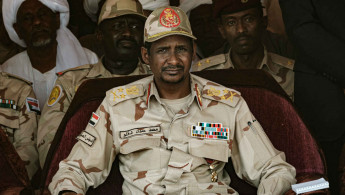Sudan protesters reject 'absolute immunity' for generals
Sudan's key protest group is opposed to giving the military "absolute immunity" against prosecution for violence against demonstrators, a spokesman said, as the two sides held talks on a power sharing deal.
"We refuse absolute immunity that the military rulers have asked for," Ismail al-Taj, a spokesman for the Sudanese Professionals Association (SPA) protest group told reporters in Khartoum.
His comments came just before the ruling generals and protest leaders sat down to fine tune the landmark deal agreed earlier this month after mediation by African Union and Ethiopian mediators.
The deal, which is yet to be formally signed, aims to establish a transitional governing body to install a civilian administration for a period of just over three years.
Taj said the military council, which has ruled since the ouster in April of veteran president Omar al-Bashir, is demanding "absolute immunity" from prosecution - which did not appear in the landmark deal.
"When we agreed on the draft agreement this was not there," prominent protest leader Ahmed al-Rabie told AFP.
"We totally reject it," Rabie said, confirming the latest request by the ruling generals.
Bashir was ousted by the army on April 11 following weeks of nationwide protests against his rule, and after thousands of protesters camped outside the military headquarters in central Khartoum.
Protesters continued with their sit-in demanding that the generals themselves step down.
But on June 3, demonstrators were violently dispersed by men in military fatigues in a pre-dawn raid on the protest site outside army headquarters.
The military council insists it did not order the raid, which according to the protest movement killed more than 100 people and left hundreds wounded.
Tuesday's talks come after several postponements requested by the protest movement, which had asked for more time for consultations before resuming negotiations with the generals.
Taj said he expected "a breakthrough" to emerge from the discussions on Tuesday.
The SPA is the key protest group in the wider movement known as the Alliance for Freedom and Change.
Follow us on Twitter: @The_NewArab





 Follow the Middle East's top stories in English at The New Arab on Google News
Follow the Middle East's top stories in English at The New Arab on Google News
![Both Hamas and the Palestinian Authority welcomed the ICC arrest warrants [Getty]](/sites/default/files/styles/image_330x185/public/2024-11/GettyImages-2178351173.jpg?h=199d8c1f&itok=TV858iVg)

